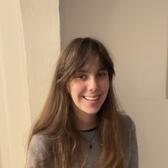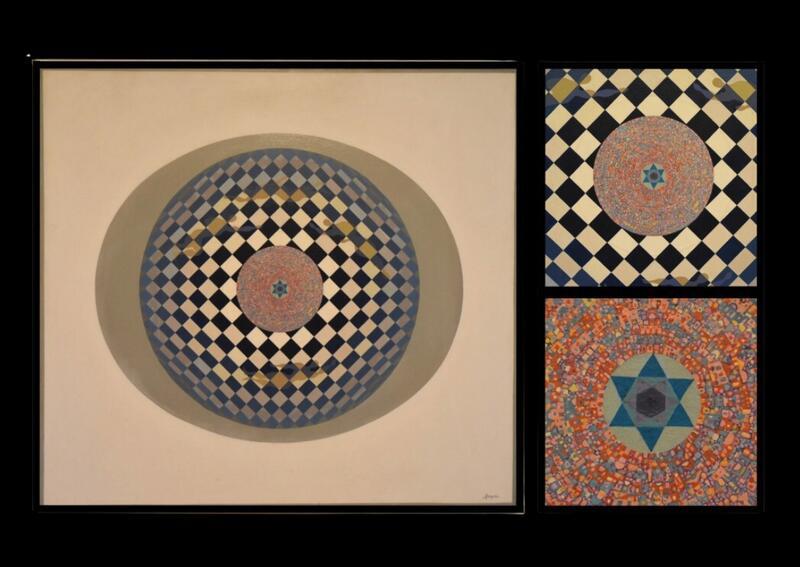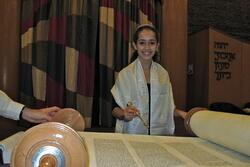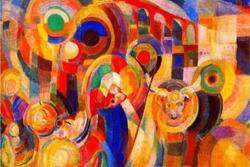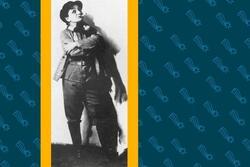Building Connections Though My Great-Grandfather’s Paintings
I have lived with my parents and my brothers in Wisconsin for my entire life. Our home, nestled between the Great Lakes, has left us geographically isolated from our extended, Northeast-rooted family of the present and the past. This geographical isolation has, at times, made me feel not only physically, but also culturally distant from the people with whom I share some of the most intrinsic components of my identity: blood and centuries of familial history.
From not being able to celebrate Jewish holidays or share family milestones together, to simply eating Shabbat dinner hours apart due to time zone differences, the distance separating me in the Midwest and my family in the Northeast has created a gap between our respective family customs and Jewish practice.
Determined to bridge this cultural gap, I’ve uncovered a thread, in the form of a chain of paintings that stretches across the United States and links me to my aunts, uncles, cousins, and grandparents, who live hundreds of miles away.
These paintings that link us together were made by my great-grandfather, who we all call Zayde, after his immigration from Imperial Russia in the early 1900s. Zayde painted for over 60 years, and his creations are an amalgamation of incredible talent and decades of experience as an American Jew.
Today, Zayde’s body of work maintains a colorful presence in my home and in the homes of my extended family across the United States. Although the paintings are stylistically diverse–some containing striking Matisse-like colors, others utterly indistinguishable from a photograph, many dominated by sharp geometric shapes–each is marked by my Zayde’s signature and embedded with his own combination of Jewish culture, religion, history, and family.
In “Watchmen of Jerusalem,” a large painting that dominates the main wall of my living room, fluid human silhouettes swoop around a circular snapshot of Jerusalem. This work references Isaiah 62:6, which describes the responsibilities of the Jewish people in biblical Israel for guarding and preserving Jerusalem. This work’s iconography reflects the goal of Jewish statehood that has been a cornerstone of modern Jewish history.
Similar Israeli iconography appears in many of Zayde’s paintings, including a piece portraying a vivid rainbow stretching over Jerusalem that hangs over a mantel in the home of my great-aunt and uncle. When I visit them and my cousins in Massachusetts, the slight hesitation that often hangs in the air (naturally formed by 1,000 miles of geographical separation) ebbs away when I see this work on their wall. It’s comforting, seeing the familiar geometric outline of Jerusalem’s architecture. The buildings offer a reminder that Judaism creates an innate connection between me and my family, regardless of geographical, or even cultural, separation.
In addition to Israeli themes and motifs, many of Zayde’s works are also overwhelmed with sharp geometric shapes. From carefully proportioned three-dimensional Hebrew letters that leap off the canvases, to triangular Stars of David, to layers upon layers of colorful circles and squares, cubist contours are paramount within Zayde’s paintings. This pervasive presence of angles and lines was heavily influenced by Zayde’s career as an architect and his experience working in a factory during World War II. His factory job consisted of designing patterns on flat tin that were then folded into three-dimensional objects for military use. This design work contributed to his strong aptitude for crafting geometric outlines, and his resulting shape-filled artwork offers continuous reminders of experiences–immigration and industrial work on the home front–that were common to many Jewish-American immigrants.
Zayde’s hyper-realistic portraits of Benny Goodman and Albert Einstein (one of which silently urges me to complete my calculus homework from the corner of my living room) further reflect our family’s characteristics alongside Jewish culture and history. Just as these two Jewish icons are forever associated with the realms of art and science, my family is defined by individuals who deeply value intellectual, musical, and artistic exploration. There’s my aunt, an interior organizer and clarinet player; my dad, an avid collector of vintage pottery wheels and a creator of intricate metal and woodwork designs; my cousin, a rabbi and a cantor; and myself, a lover of books, music, movies, and creator of glasswork jewelry. Zayde’s paintings, depicting cultural and artistic exploration within Jewish history, remind me of these close ties I have with my relatives through music, art, and learning.
Each of Zayde’s paintings connects me to a different component of my lineage and my Jewish culture. Together, as a collection, the works present a snapshot of my family and my history as an American Jew.
These common threads of Judaism, history, and our family embedded within Zayde’s paintings stretch beyond the constraints of physical distance, serving as permanent reminders of the unbreakable connection I have with my family through Judaism and our shared history.
Zayde’s works thus offer me an enduring reminder of the diverse cultural and religious community that is intrinsic to Judaism. The Jewish people are dispersed across the world, reflecting the centuries of migration our people have experienced throughout history. Despite this, Jews are nevertheless connected by a common history and shared cultural and religious values–just like my family and Zayde’s diverse body of work.
Judaism offers me a place in a unique community that stretches across the globe. The Jewish community is constantly evolving, extending, and diversifying. Despite the differences and distance between myself and other Jews around the world, I know I will always be able to find community and connection through Judaism.
While I only met Zayde once, his legacy of his incredible paintings will forever impact my relationship with my family and with the community of Jewish people around the world.
This piece was written as part of JWA’s Rising Voices Fellowship.

